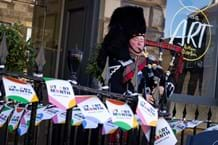Though the intentions of Kent County Council to create a registration scheme had been publicised (details of the scheme appeared in Antiques Trade Gazette No 1373, January 30), there has been general surprise that the Private Bill required to enact this form of local variation to UK law has already received its second reading in the House of Lords.
Local dealers are protesting that they have never been directly consulted on a matter which will leave Kent at an unfair disadvantage compared with traders in every other English county except North Yorkshire, where a similar scheme has been in operation for some years.
“I have spoken to dealers in Yorkshire and they really feel at a disadvantage. I see no reason why Kent dealers should join them,” says Sittingbourne dealer, Georgina McKinnon who, with David Jackson-Grant of Teynham, is planning to oppose the progress of the bill through parliament.
Along with many other dealers in the county McKinnon and Jackson-Grant are not fundamentally opposed to the concept of registration or the control of fly-by-night traders, but believe the conditions imposed show no understanding of the real circumstances of antique dealing.
Among other things the bill requires that anyone whose business involves, either wholly or in part, transactions in secondhand goods must:
•register themselves and their premises
•keep a record of all purchases, including the date, a description of the articles and the name and address of the seller
•keep a record of all sales of more than £100, including the name and address of the buyer
•display a registration certificate at all times
•refuse to buy from anyone under the age of 16 where the value of the goods exceeds £10
In addition, events organisers are required to keep extensive records of participants and to inform the council three weeks in advance.
LAPADA have also expressed concern over the lack of debate on the issue and chief executive Malcolm Hord is meeting Kent trading standards officers this week to review the situation.
“Our concerns range from whether existing legislation already gives Kent TSOs and police all the necessary powers they need, to identifying just what it is in Kent that requires such urgent legislation but not in say Sussex,” he says. “We are also concerned about additional bureaucracy and new burdens placed on anyone who happens to carry out his or her perfectly legitimate business in Kent.”
However the only hope of amending the Bill is likely to be in Parliament.
At present the Bill is before the Unopposed Bill Committee in the House of Lords, an earlier objection raised by Ashford Cattle Market having been withdrawn. A mirror bill applying to Medway Borough Council, has also reached this stage.
Further written submissions to this committee are allowed.
From this stage the Bill would proceed to a third reading in the Lords before three readings in the Commons, where further objections and petitions are permissible.
Unlike other bills a Private Bill can be carried over into the next Parliamentary session.
Kent dealers plan to block registration bill
UK: GROWING concern has led to calls for action among dealers in Kent faced with a new law which would make it a criminal offence not to register and keep detailed records when buying and selling secondhand goods in the county.




